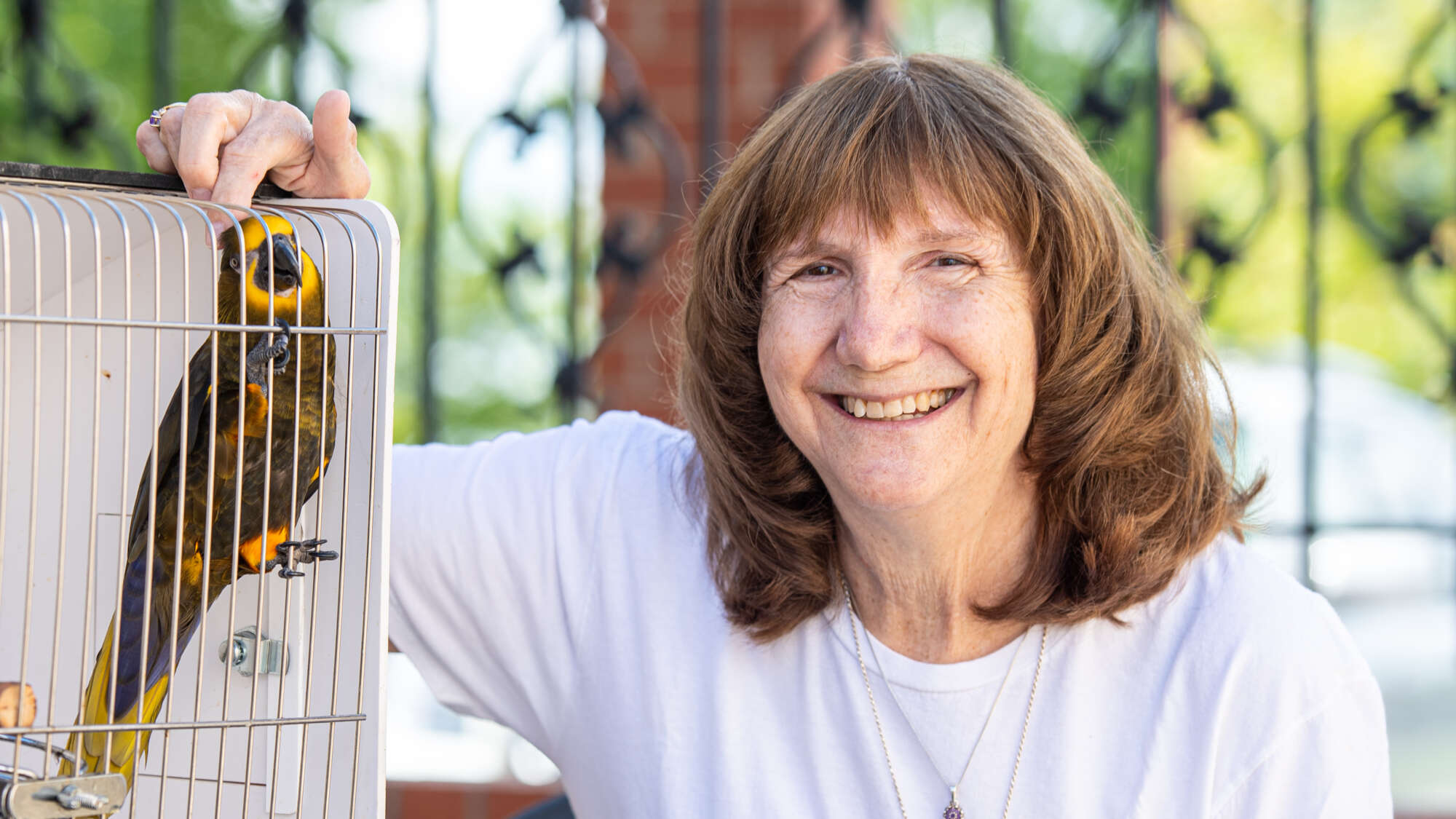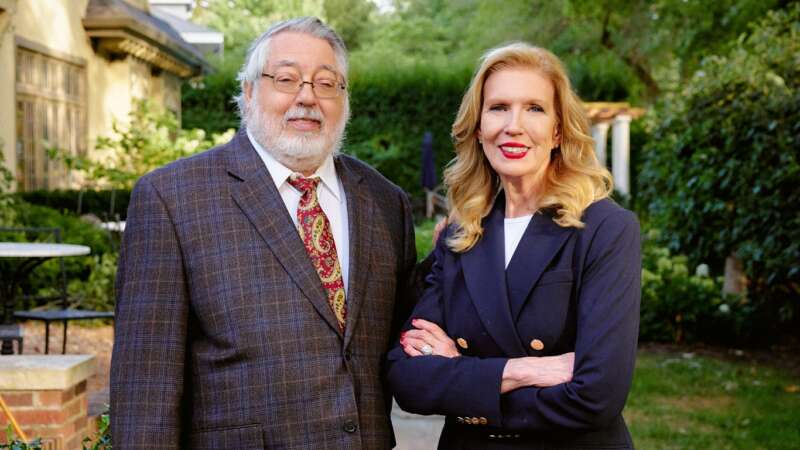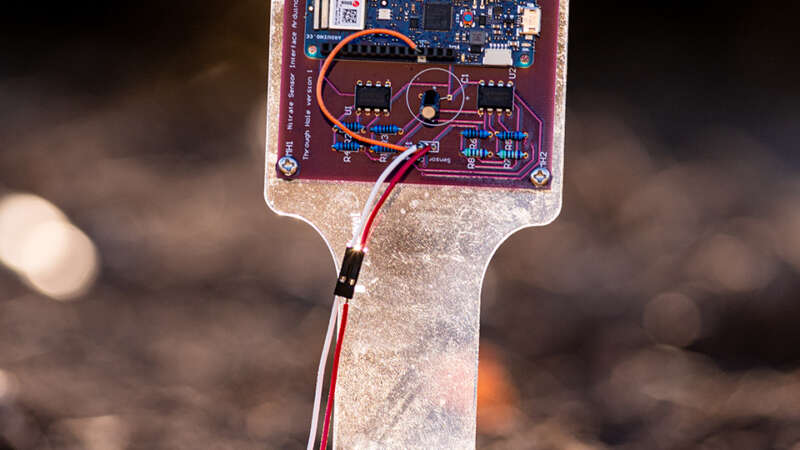A Wildcat’s passion leads to support for avian medicine
Janet Brubaker has had a passion for birds as long as she can remember, having acquired her first parrot in 1981.
Being a Kansas State University alumna through and through, Janet graduated with her degree in home economics education in 1974 and received her master’s in human ecology in 1980. She taught for 42 years and is now happily retired. While living in Hawaii, Janet was able to purchase her first parrot, and from then on, it was all about following her passion.
Currently she is a co-chair of the Society of Parrot Breeders and Exhibitors. Its goal, and hers, is to seek to improve the lives of parrots by sharing knowledge with pet owners and breeders.
As a member of the society, she travels around the country, going to bird shows and club meetings to share her bird experience and knowledge (and her birds) with the world, and spread the message of extinction and how we can prevent it in parrots. Many parrot species are listed as endangered and, therefore at risk of extinction. Too many parrot species have been lost forever.
For Janet, that goal of raising awareness and knowledge now aligns with her donation to the College of Veterinary Medicine. By creating two scholarships for students and establishing the Avian Medicine Excellence Fund, she has created the opportunity for faculty to continue their research in avian medicine and promote the field to all veterinary medicine students looking to gain more knowledge and experience in providing health care to birds.
“I wanted a way to make my assets and my passion mean something,” Janet said. By establishing these funds, she now has the opportunity to contribute to the field of avian medicine from the ground up. “If this is a way to get more avian veterinarians out there, then great!” she said.
Her donation to K-State supports both veterinary students and avian research, and can help provide the service with improved diagnostic and treatment equipment. That’s something that Dr. James Carpenter, professor in the College of Veterinary Medicine who specializes in exotic pet, wildlife and zoo animal medicine, can appreciate.
“More funding provides this program with so many great benefits. Besides scholarships, we can help students attend national or regional conferences pertaining to avian medicine. But funding to help support our research is also very much appreciated,” Carpenter said.
A large part of the veterinary school experience at K-State is getting hands-on experience working in clinics. Gaining this experience can be difficult for students and practitioners because of the cost associated with the diagnosis and treatment of diseases in birds.
“Some clients come in and do not have the funds to pay for the treatment of the bird,” Carpenter said. “So in select cases, some of this funding can be used to defer medical costs in pet birds, and these teaching opportunities could enhance a student’s training.”
For Carpenter, Janet’s story reflects what he sees every day. “Student interest is very high for this specialty, and they have a great opportunity to make a real contribution to this growing field.”
Currently, students in avian and exotic animal medicine can participate in a variety of research studies, including pharmacokinetic studies, which can determine the dose and frequency of a drug that should be administered into a bird. Without this data, veterinarians would have to extrapolate on dosages, based on drug use in other species such as cats or dogs. And often these extrapolated doses may be inappropriate for a bird.
With birds being the fourth most popular pet in the country, it can be easy to see why more focus on avian medicine is needed.
“For me, they bring a great deal of joy, and I would like there to be more people out there who see this as a field they can grow with and learn a lot in,” said Janet.
When asked why she donated to K-State’s College of Veterinary Medicine, Janet said, “It was a win-win situation. On one side we get more research and more vets in the avian field, and on the other I get to see the industry grow and hopefully raise more awareness about birds and their health issues.”
Carpenter can see growing awareness every day in the people with whom he works.
“Many species of birds make great companions for people. They are very smart, and they can have good interactions with people,” Carpenter said. “Birds are just cool and exciting to work with. However, not all birds make good pets, so anyone interested in obtaining a bird needs to do a lot of homework on what is required to care for a bird; a potential owner should also check with bird experts, including exotic pet veterinarians, before acquiring a bird. We are very fortunate that our College of Veterinary Medicine has a program that gives us the opportunity to take care of birds and other exotic pets.”
When asked what she hopes students gain from the scholarships, Janet said “I would encourage students to look at all their options and see how many parrots there are in the country. Someone with an education in avian medicine would do really well out in the field.”






